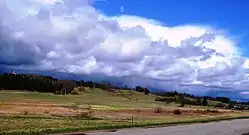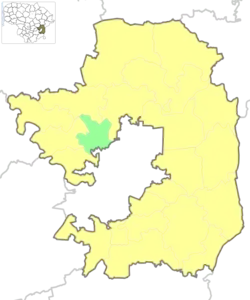Avižieniai Eldership
Avižieniai Eldership (Lithuanian: Avižienių seniūnija) is an eldership in Lithuania, located in Vilnius District Municipality, northwest of Vilnius. It is the most populous eldership in the municipality.[2]
Avižieniai Eldership
Avižienių seniūnija | |
|---|---|
 Riešė Upland crest near Mažoji Riešė | |
 Location of Avižieniai Eldership | |
| Country | |
| Ethnographic region | Aukštaitija |
| County | |
| Municipality | |
| Administrative centre | Avižieniai |
| Government | |
| • Elder | Michail Bortkevič |
| Area | |
| • Total | 52.08 km2 (20.11 sq mi) |
| Population | |
| • Total | 11,598 |
| • Density | 220/km2 (580/sq mi) |
| Time zone | UTC+2 (EET) |
| • Summer (DST) | UTC+3 (EEST) |
| Website | https://www.vrsa.lt/go.php/lit/t |
Geography
The eldership has a hillfort with a cultural layer dated to the beginning of 1st millennium A.D.[1] The landscape is dominated by rolling hills in the Riešė Upland. Many small wooded areas and swamps, but the landscape is undergoing rapid change due to suburbanization and its proximity to the city. Notable rivers include Riešė and Čekonė, and there are several small lakes, such as Gilužis, Ežeraitis, Notiškis and Varlinka.
History
Avižieniai were known since the Interwar for their gardens. In the 19th-century, an orthodox church was built in Bukiškis. It was damaged during World War II, and only ruins and the basement remain, and are known to have the buried corpses of a general. The church rebuilding project was initiated in 1990, and the church was rebuilt in 2007.[1]
Populated places
There are 27 villages located within the eldership, the largest of which are[1]Avižieniai, Bukiškis and Riešė (of which only half of the village is located in the eldership, the other half belongs to Riešė Eldership).
Notable locations
- Bukiškės Orthodox Church of Patron Mother of God
- Avižieniai hillfort
- Mažoji Riešė hillfort
- Pikutiškės/Švedai hillfort
- Aukštieji Rusokai tumulus
- Galinė Manor with preserved palace and farmhouses
- Kalno Riešė Manor farmhouse fragments near Riešė
- Tarandė old cemetery
- World War II Soviet soldier burial place in Bendoriai
Ethnic composition
According to 2011 National Census data, the ethnic composition is as follows:[3]
- Lithuanian - 65.0%
- Polish - 24.4%
- Russian - 5.6%
Gallery
.jpg.webp)
 Orthodox Church of Guardian Mother of God in Bukiškis
Orthodox Church of Guardian Mother of God in Bukiškis.jpg.webp) Highway A2 crosses the eldership
Highway A2 crosses the eldership Landscape near Bajorai
Landscape near Bajorai
References
- "Department of Statistics". https://osp.stat.gov.lt. Retrieved 2021-01-07. External link in
|website=(help) - "Naujas detalus gyventojų žemėlapis". osp.stat.gov.lt (in Lithuanian). Retrieved 2021-01-07.
- Republic of Lithuania 2011 National Census